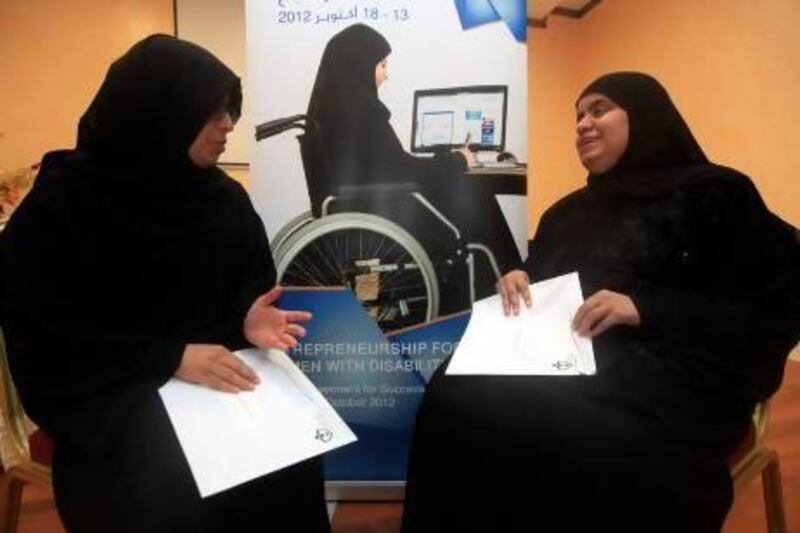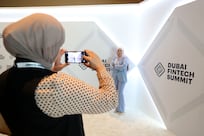SHARJAH // Sheikha Shariqi has a modest dream to open a small service centre to help people with official and legal documents in her town of Masafi.
But to achieve her ambition, the Emirati must overcome a double dose of discrimination – being a woman and being disabled.
Thankfully, help is at hand from Sharjah City for Humanitarian Services (SCHS) and the US Missions to the UAE.
The organisations have offered financial aid to the 34-year-old, who is visually impaired.
“When I start, I’d like to call my business White Hands Printing and Services,” said an elated Ms Shariqi, who won a grant after taking part in the Entrepreneurship for Women with Disabilities programme.
“I’ve dreamt about opening my own business for so long but I just did not know how to get there.”
The programme was launched by SCHS in October last year to encourage women with disabilities to consider self-employment.
Eighteen Emiratis from across the country took part in workshops focusing on how to build a business from scratch with the help of US$40,000 (Dh147,000) support from the US Missions.
They were taught about their rights then how to develop a business plan, understand financial requirements and marketing and licensing procedures.
Five projects developed at the end of the workshops – ranging from a nursery for the disabled to spas in remote areas – were selected as finalists by a jury of business professionals and the embassy to win start-up capital of Dh20,000.
Mohammed Al Nabulsi, coordinator of the programme, said self-confidence was the most important lesson, and that they had to convince the women they had the same rights as anyone else.
“It was difficult when we started because the ladies were not convinced,” he said. “We began with 30 but some did not want to continue. They were unclear about how the programme would improve their lives.”
The passive role in society of women with disabilities was highlighted in a 2011 study by UAE University (UAEU) and the Ministry of Social Affairs.
Researchers found that three quarters of disabled Emirati women struggled to find work and 80 per cent faced negative attitudes.
Sheikha Jameela bint Mohammed Al Qasimi, director general of SCHS and vice president of the Supreme Council for Family Affairs, said it was time to encourage women to come out of their shells.
“Women in general have a social disadvantage,” Sheikha Jameela said. “With a disability that disadvantage doubles or even triples.
"The UAE has done a lot to empower women to be leaders but such workshops are necessary to show them their potential."
Sheikha Jameela said the grant amount would be matched by the council and other sources to further bolster the women's careers.
Ms Shariqi, from Ras Al Khaimah, is clear about her business plan, a feature that impressed the judges.
“I need six months to open, two staff members who can support me with typing, document delivery and PR activities and Dh10,000 to start with,” said the UAEU history major, who is currently taking a course at Tamkeen, a training centre for the visually impaired.
Awatif Akbari, who was born blind, also won a grant for her Braille Prints concept, which involves converting religious, cultural and other informative books into Braille and electronic formats.
“I have faced the problem of not having reading material all my life,” said Ms Akbari, of Sharjah. “Since the days of school I have been translating books myself. This is a tedious task and I would like to offer it as a service to help others.”
Khalifa Al Jaziri, one of the judges and group managing partner of e-Home Automation, said the panel was looking for the most sustainable projects to support.
“[The winners] showcased plans that were closest to reality in terms of needs,” he said.
Iman Mohammed Al Midfa, director general of the Sharjah Business Womens’ Council, said they would be working with all five grant recipients to refine their business plans.
Ms Shariqi said the win made her feel like she had gained wings.
"Growing up I was told, 'depend on yourself, no one can help you'," she said. "Now I have help and support and this feels like real independence."
aahmed@thenational.ae






